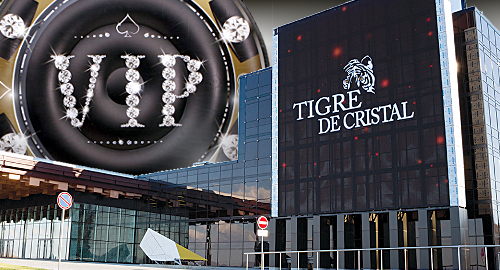 The Tigre de Cristal casino in Russia’s far east Primorye gaming zone is ditching VIPs in favor of a more modest class of high roller.
The Tigre de Cristal casino in Russia’s far east Primorye gaming zone is ditching VIPs in favor of a more modest class of high roller.
On Friday, the Hong Kong-listed Summit Ascent Holdings, which holds a controlling stake in Tigre de Cristal, released its financial results for the six months ending June 30. Revenue improved a modest 2% year-on-year to HK$207.8m (US$26.5m) but adjusted earnings improved 17% to HK$66.8m and profit swung to HK$2.6m from a loss of HK$5.4m in H1 2017.
Once again, it’s time to explain the tangled web of Tigre de Cristal’s operations: Summit Ascent holds a 60% stake in the casino’s actual owner Oriental Regent Ltd, while the casino’s operations are handled by Summit’s wholly owned subsidiary G1 Entertainment, which earns a management fee of 3% of the property’s gross gaming revenue.
The casino’s VIP gambling turnover fell 22.5% year-on-year to HK$6.5b in H1, while VIP gross win fell 38.2% to HK$189m as win rate fell 0.74 points to 2.9%. After deducting VIP rebates, net VIP win was down 44.5% to HK$41m. It’s worth noting that the casino’s average number of VIP tables fell to 12 from 16 in H1 2017.
Summit said it remains “sanguine” regarding the VIP slowdown, saying it has come under “increasing pressure” from junket operators seeking higher levels of rebates since the year began. Summit has resisted these requests, choosing instead to focus on developing its own ‘premium mass’ business.
The casino’s mass market numbers appear to support this strategy, as mass table drop rose more than one-third to HK$348m and net win spiked 47.3% to HK$84m.
The slots business, which primarily caters to a local clientele, reported handle up 44.4% to HK$1.35b but a lower win rate kept slots revenue’s gain to 27% (HK$66m).
Tigre de Cristal’s average hotel occupancy was largely unchanged year-on-year at 76% on the weekends but just 45% on weekdays. Still, hotel revenue fell 22% to HK$17m due to fewer high-rolling clients.
Summit says it’s encouraged by the Primorye region’s rising foreign tourist visitation, which is growing at a annual rate of 33% over the past five years. At the end of H1 there were 50% more direct flights to the region than one year ago.
Summit says it is currently refining the design and construction requirements of Tigre de Cristal’s Phase II, construction of which is expected to commence next spring with a targeted opening in “the latter half of 2020.” Phase II originally targeted a late-2019 opening but delays stemmed from alterations in financing and design options following “recent changes in substantial shareholders.”
Summit also says it’s observed “an acceleration of building works” by other Primorye operators, including NagaCorp’s Naga Vladivostok and Diamond Fortune Holdings’ Selena project. Assuming these other operators continue at this accelerated pace, Summit says it may start to see the benefits of a “cluster effect” of casinos as early as 2021.